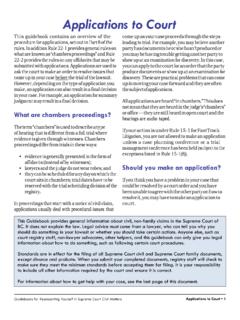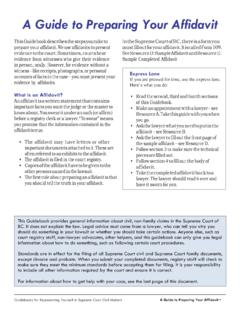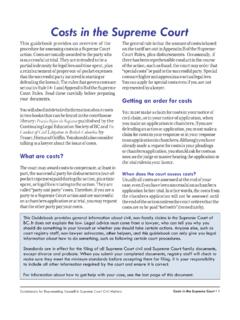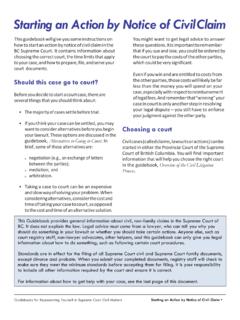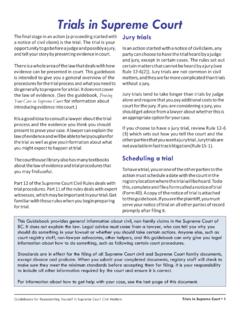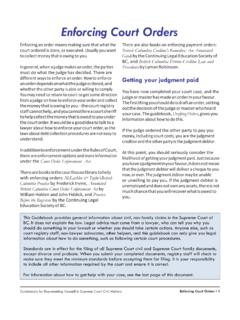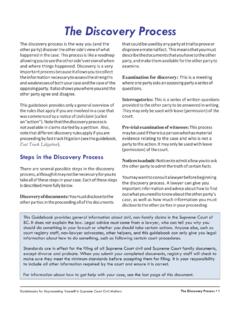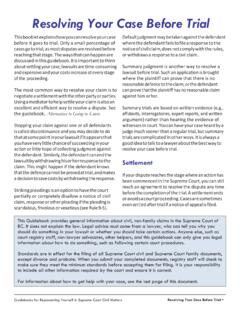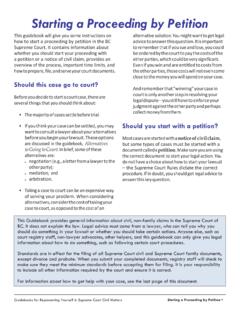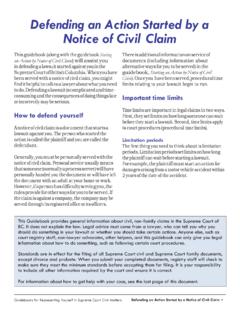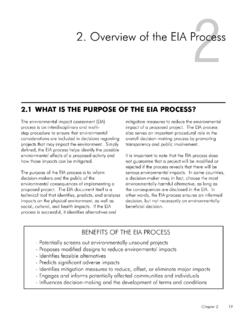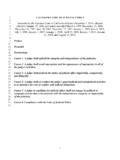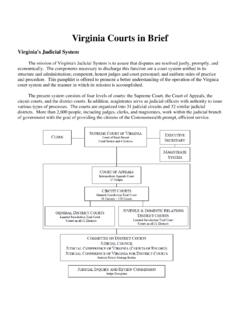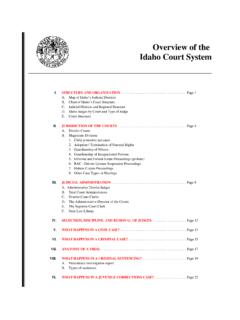Transcription of Judicial Review - Supreme Court BC
1 Judicial Review Guidebooks for Representing Yourself in Supreme Court Civil Matters Judicial Review This Guidebook contains an overview of the procedure for a Judicial Review . In a Judicial Review , the Supreme Court of BC is asked to set aside a decision of a government body, like a tribunal. Judicial Review A Judicial Review is a complex legal process. Several statutes or Acts set out the rules for a Judicial Review . Two of these are the Administrative Tribunals Act, which sets out the time limits for applying for a Judicial Review , and the Judicial Review Procedure Act, which sets out the procedural requirements. If you are thinking of applying for a Judicial Review , you need to read these Acts. Several Supreme Court Rules also apply to applications for Judicial Review .
2 You will also need to be familiar with them. You can find all of the Rules and Acts at any courthouse library or at the websites set out at the beginning of this Guidebook. Judicial reviews are started by filing a document called a petition. (Petitions are discussed below.) You should also read two other Guidebooks in this series: Starting a Civil Proceeding in Supreme Court and Chambers Applications. Those Guidebooks contain much of the information you need to carry on your Judicial Review . You should also Review the Guidebook, overview of the Supreme Court Civil Process, to understand the Court process and how to get started on some procedures. This Guidebook gives you only a general introduction to Judicial reviews. To apply for a Judicial Review , you will need to do more research on the law, the Rules and the Acts that apply to your specific case.
3 You should also think about talking to a lawyer about whether Judicial Review is appropriate for your case. A lawyer will also be able to help you understand your chances of success if you proceed. What is Judicial Review ? A Judicial Review is a legal procedure that takes place in the Supreme Court . In a Judicial Review , a Supreme Court judge reviews a decision that has been made by an administrative tribunal or an administrative decision maker. What is an administrative tribunal or administrative decision maker? The government of BC creates tribunals to interpret and enforce certain laws, such as residential landlord and tenant issues. Tribunals are specialized decision makers because their decisions concern a specific subject area (such as workers compensation, or landlord and tenant issues).
4 They are less formal and more cost-effective than courts. This Guidebook provides general information about civil, non-family claims in the Supreme Court of BC. It does not explain the law. Legal advice must come from a lawyer, who can tell you why you should do something in your lawsuit or whether you should take certain actions. Anyone else, such as Court registry staff, non-lawyer advocates, other helpers, and this guidebook can only give you legal information about how to do something, such as following certain Court procedures. Standards are in effect for the filing of all Supreme Court civil and Supreme Court family documents, except divorce and probate. When you submit your completed documents, registry staff will check to make sure they meet the minimum standards before accepting them for filing.
5 It is your responsibility to include all other information required by the Court and ensure it is correct. For information about how to get help with your case, see the last page of this document. Judicial Review Guidebooks for Representing Yourself in Supreme Court Civil Matters The government has given tribunals the authority to make decisions about certain issues. The courts recognize that tribunals have specialized knowledge and experience in their particular subject areas and, because of that, the courts will not easily interfere with a tribunal s decision. Here are some examples of the situations where you can apply for a Judicial Review : Residential Tenancy Act issues: A landlord has given notice to a tenant to move out. A Dispute Resolution Officer at the Residential Tenancy Board has heard the case and agrees with the landlord.
6 The tenant can apply for Judicial Review of that decision. Workers Compensation Act issues: The Workers Compensation Appeals tribunal has made a decision that a worker has not suffered a permanent disability. The worker can apply for Judicial Review of that decision. Time limits for applying for a Judicial Review Time limits are very important in Judicial Review applications as they are for all Court procedures. Under the Administrative Tribunals Act, the time limit for filing an application for Judicial Review in Court is 60 days from the date of the tribunal s decision. If you do not file your Judicial Review application within the time limit, you may lose your right to apply. However, the 60-day time limit does not apply to all administrative tribunals.
7 You should not delay in filing your application you may find that you have missed an important deadline. Sometimes the Court will grant an extension of the time, but there is no guarantee that it will do so. When deciding whether to grant an extension, the judge will consider the amount of time that has gone by and the reason for missing the deadline. Consult a lawyer as soon as you receive a decision from a tribunal or decision maker. A lawyer can help you decide whether you have a good case for Judicial Review and can advise you about the time limit that applies to your application. The Judicial Review Procedure Act The Judicial Review Procedure Act of BC sets out the procedure for Judicial Review of provincial tribunal decisions. This Guidebook and the Judicial Review Procedure Act only cover Judicial Review of decisions made by provincial tribunals.
8 The procedure for reviewing decisions of federal tribunals is set out in federal legislation called the Federal Court Act and in the Federal Court Rules. A decision of the Immigration and Refugee Board dismissing a claim for refugee status is an example of a federal tribunal decision. This Guidebook does not provide any information about Judicial reviews of federal tribunal decisions. Who can apply for Judicial Review ? The word standing is used to describe someone who can apply for Judicial Review . In order to have standing to apply for a Judicial Review , a person must either be a party to the proceedings being reviewed, or must be directly affected by the action or decision of the tribunal. A person who is only indirectly affected by the tribunal s decision or action does not have standing.
9 When will the Court allow a Judicial Review ? There is no automatic right to Judicial Review . The Court will not allow a Judicial Review in every case. In general, the Court will only allow a Judicial Review in limited circumstances. A judge will not allow a Judicial Review to correct a technical error made by the tribunal if the judge does not think that the error caused any harm or prejudice to you. However, the Court will intervene if the tribunal did not give you a procedurally fair hearing. It will also intervene if the tribunal had no authority to deal with the subject matter of your case. Judicial Review Guidebooks for Representing Yourself in Supreme Court Civil Matters A Judicial Review is not a re-hearing A Judicial Review is not a re-trial or a rehearing of your case.
10 The judge does not focus on whether he or she would have made a different decision from the one made by the tribunal. In a Judicial Review , the judge generally focuses on determining whether the tribunal had the authority to make a particular decision and whether the tribunal exercised that authority. The standard of Review The standard of Review is an important legal concept in Judicial Review hearings. The standard of Review tells the judge how serious an error has to be before the decision can be reviewed. In other words, the judge uses it to decide whether the tribunal made a type of error that warrants Court intervention. There are different standards of Review for different kinds of tribunals. For example, there is a very high standard of Review for some kinds of tribunals.
